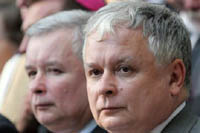EU wishes new Polish Parliament not to be so problematic, as current

The EU is very interested in Polish election outcome because it will show if the Eastern country continues its isolate way or moves toward the mainstream in its relations with the rest of the bloc.
Prime Minister Jaroslaw Kaczynski's nationalist, socially conservative Law and Justice Party faces the pro-business and more pro-European Civic Platform - which in 2005 suffered a double defeat in presidential and parliamentary polls.
No love has been lost between the Polish government and the EU since Kaczynski and his identical twin brother, President Lech Kaczynski, shot to power two years ago.
Spats between Warsaw and the EU have ranged from the economy to environment to human rights, and few in Brussels wish to continue dealing with Poland in the current confrontational manner.
"All over the political spectrum, from the Greens to the Christian Democrats, there is a feeling a continuation of the present government would not make things easier for anyone," said Joost Lagendijk, a Dutch member of the European Parliament's foreign affairs committee.
"There's a strong desire to see a government in place after the elections that wouldn't so openly make life difficult for the EU," he said.
Under the Kaczynskis, Poland - a major beneficiary of EU financial aid - has acquired a reputation as a ruthless, strident and volatile negotiator defending national interests with little desire for consensus.
While in the early stages of their rule fellow EU governments tended to avoid open conflicts, patience has given way to anger during some of the recent controversies.
Last month, Poland, a staunchly Roman-Catholic country of almost 39 million, blocked a plan to hold a European day against the death penalty, demanding that it is linked to a wider debate over abortion and euthanasia. British Justice Minister Jack Straw retorted he couldn't accept the argument. His German counterpart, Briggite Zypries, said Poland's demand "wasn't an issue" for anyone else.
Other recent feuds range from Poland's demands for changes to the EU's future voting rules to boost its power to a refusal to respect EU cod catch quotas in the Baltic Sea.
Poland, which joined the EU in 2004 together with nine other countries, is also at the center of the EU's spat with Russia. Warsaw has blocked talks on an EU-Russia economic agreement in retaliation to a Russian ban on Polish meat and plant products since late 2005 over alleged health concerns. Although some were reluctant, all EU nations eventually backed Poland in that fight.
Analysts say Law and Justice - which opinion polls show running neck and neck with Civic Platform - is only slowly adjusting to the rules of the 27-nation club, where overt hostility is rare and compromises are forged on even the thorniest issues.
"Poland will come into line with the way EU does things eventually. They're slowly learning the rules of the game, although there won't be any change overnight," said Amanda Akcakoca, a policy analyst with the European Policy Center, a Brussels-based think tank.
Some analysts predict Poland's presidency of the EU, scheduled for 2011, is likely to have a major moderating effect on the country's political elite, no matter which party will be in power.
"Then they will have to move to the center ground and become a neutral mediator, a far cry from today's position. That will no doubt change the fashion in which Poland deals with Europe," said Pawel Swieboda, director of the Warsaw-based DemosEuropa think tank.
Subscribe to Pravda.Ru Telegram channel, Facebook, RSS!


